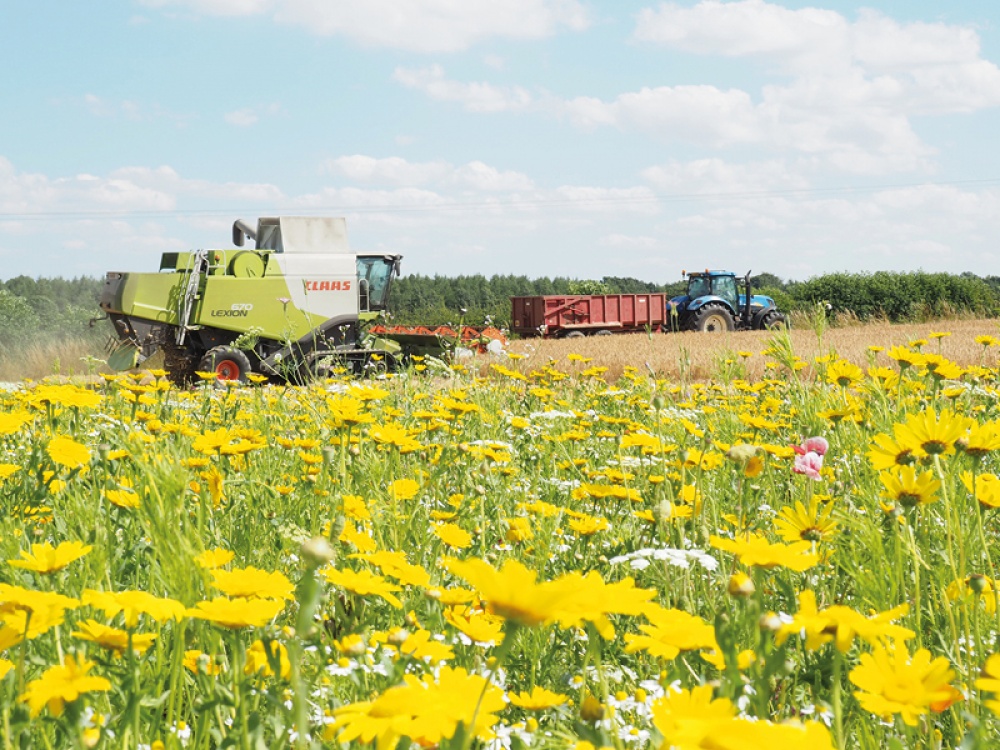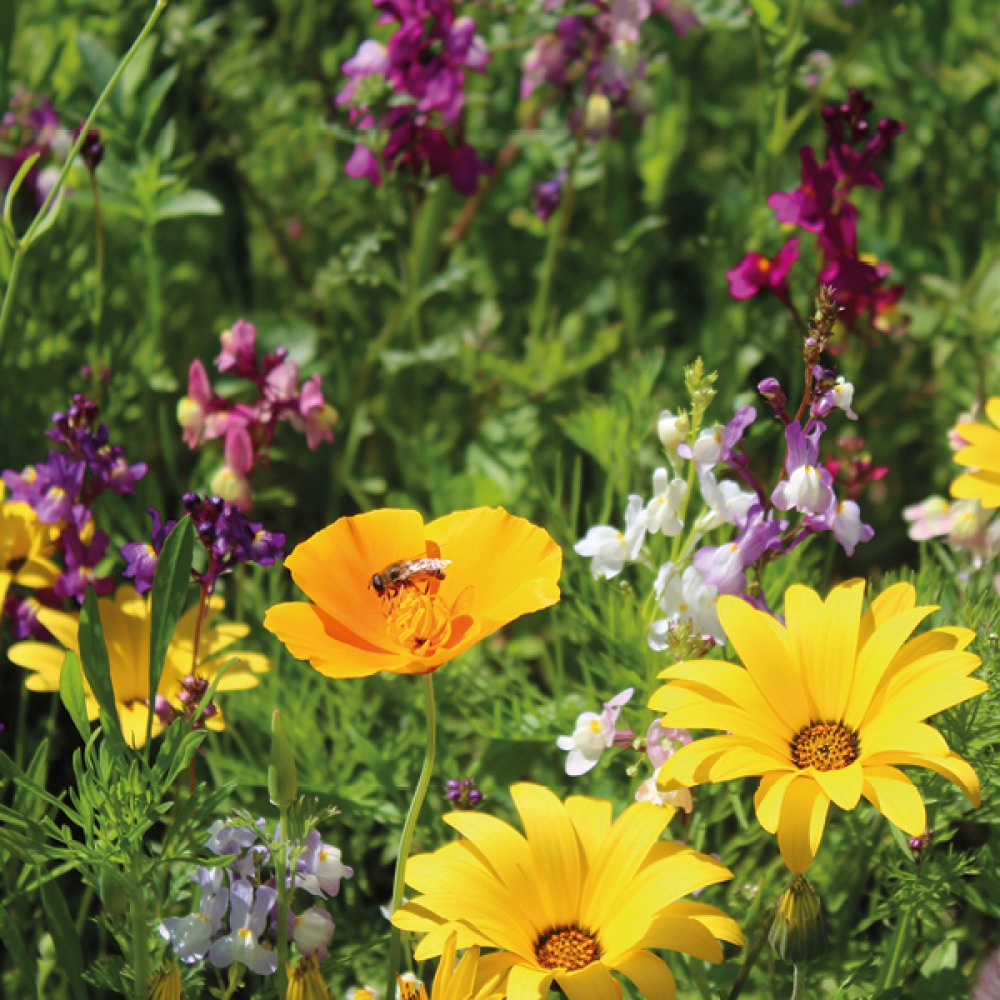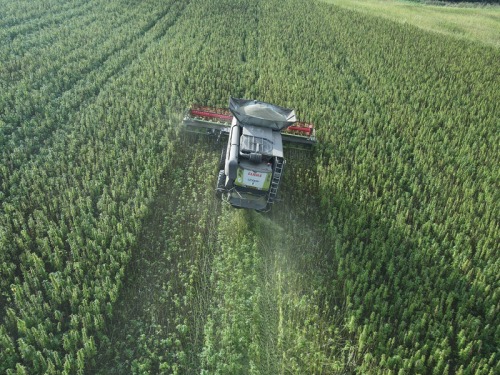North Yorkshire Farm Using Flowers to Diversify

We discover how this farming family are using flowers to diversify, improve soil health, and start a vital conversation about the future of British farming
For one family, the answer might well begin with a pick-your-own flower field, which they opened for the first time last summer.
The Johnson family have been farming at Mallard Grange Farm, near Ripon, since 1933 and it’s currently managed by James and his father Charles, while mum Maggie is in charge of the farmhouse B&B and self-catering accommodation. James’s brother William doesn’t live at home, but is often back to help on the farm, and his photography skills have come in handy as they try to share what’s going on at the farm on social media. James’s partner Emily is also kept busy, updating the website, working on marketing, and helping James with whatever else needs to be done – from packing eggs to planting trees and moving cattle. It is, in other words, a real family affair.
‘Family is at the very heart of our business,’ says Emily. ‘James and his dad are the perfect team, combining a lifetime of knowledge and expertise with enthusiasm for the future of farming and new possibilities.’
Last August, a new generation joined the farm with the arrival of James and Emily’s daughter Jemima. ‘She arrived right at the height of wildflowers and harvest – but at least she didn’t arrive on market day!’ Emily laughs.

When Covid hit, James had the time to do some real research into the world of regenerative agriculture. ‘James really started to focus on key regenerative farming principles, which include minimising soil disturbance, maximising crop diversity, keeping soil covered to protect against erosion, maintaining living roots and integrating livestock,’ Emily explains. ‘These principles all help to improve soil biology, which in turn enhances the soil’s function and structure. Healthy soils increase the nutritional density of the foods we produce, reduce the need for artificial inputs, and lessen the impact of extreme weather conditions. His belief is that good food shouldn’t cost the earth and we can farm in harmony with Mother Nature.’
This thinking led, in turn, to the launch of The Flower Field. ‘We realised that we needed to start telling our story, talking more openly to the public about how we farm and what sets us apart,’ says Emily. ‘We needed to find a way to get people down the farm lane so that we could directly market our produce and increase our customer base to make it all viable.
‘We settled upon wildflowers because it aligned perfectly with many of our core values. The 33 different varieties within our seed mix demonstrates diversity and the flowers attract a whole host of beneficial insects.’ The Johnsons now plant wildflower borders around their arable land. This has a complex root structure, which benefits soil health, and also provides bird feed for the autumn and winter months.
The first batch of flowers grew well and the response from visitors last summer was overwhelmingly positive. ‘We are hoping this wasn’t just beginner’s luck and that we can replicate the success again this year. It gave people an opportunity to immerse themselves in the flowers and get lost in our Jumanji jungle of eight-foot sunflowers,’ says Emily. Importantly, The Flower Field also opened up the conversations that Emily and James were hoping for. ‘It sparked lots of conversation around the key principles of regenerative agriculture, smashed some of the myths around farming practices and their negative environmental impact, and helped to put Mallard Grange firmly on the map for a great day out with the family,’ Emily says.

‘It provided us with an opportunity to meet with the public and understand what they are looking for when buying food. It is so important that people reconnect with agriculture and understand where their food is coming from. Many years ago, a lot more people had a direct link to agricultural but nowadays it is few and far between, which is creating a gap in knowledge and understanding of food production.’
With the aim of continuing these conversations, James often speaks at local events and meetings, and has welcomed guests to the farm for educational tours too. ‘UK politics, changes in government policies, food security and funding are always at the forefront of conversation amongst the farming community,’ says Emily. ‘The mood amongst fellow farmers right now is at an all time low, as we do not feel like we have a voice and are being heard. We therefore aim to be more self-sufficient as a business and rely less on government support wherever possible. Trade deals and global politics can also massively affect how a small Yorkshire farm can function, impacting on production costs and profit margins.’
Even taking all of these challenges into account, there’s nowhere Emily and James would rather be. ’It’s not just a job,’ says Emily. ‘It’s a lifestyle, a passion and a dream to work with the people we love. Working outdoors and being surrounded by nature is good for the soul.
‘The positive response we get when people visit the farm or taste our produce for the very first time is so rewarding, knowing that we are building something special and creating a legacy that we can be proud of.’
The ultimate aim is for Mallard Grange to build a reputation for producing some of the best quality meat, eggs and farm produce available on the market. They’re soon to launch an online shop, and can now send deliveries of their produce across the country (as well as Yorkshire). They aim to work with more local businesses, and to run more farm tours and educational visits too. While The Flower Field was a success last year, not everything went to plan (the pumpkins for example were badly affected by hail storms and slug damage, but they’re planning to try again this year). Emily is also planning something new, which she refers to as a ‘chaos garden’ – a mix of vegetable seeds, all scattered together to see what happens.
‘Mallard Grange never stands still, we are always thinking “what’s next?” We just need a lot more hours in a day and all hands on deck to make things happen, but watch this space!’










